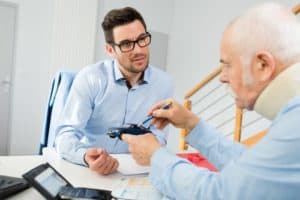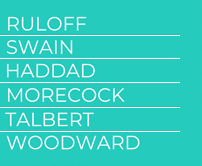Determining Fault for a Car Accident in Virginia Beach

When two or more vehicles collide, determining who is at fault for the crash is often an important-yet-challenging task. While crashes in public places with several witnesses could provide enough evidence to settle any disputes quickly, others could be more difficult to resolve.
Liability for an accident can quickly devolve into a he-said-she-said situation, with parties refusing to accept blame. This is often because of the insurance implications for the at-fault driver. In most states, the driver’s liability coverage will be responsible for paying the medical expenses, lost wages, vehicle repairs or replacement, and other damages.
If you’ve been involved in an accident in Virginia Beach, legal help is available to you. An experienced car accident attorney like those at Ruloff, Swain, Haddad, Morecock, Talbert & Woodward, P.C. can investigate the accident, identify all liable parties, and help build the strongest claim possible on your behalf.
Don’t count on the other driver accepting responsibility, and don’t pay out of pocket for an accident that was not your fault. Contact us to schedule a free consultation today.
How is Fault Determined After a Car Accident in Virginia Beach?
After a crash, law enforcement officers who respond to the scene will gather statements from drivers, vehicle occupants, and any witnesses. From there, the information will go into the officer’s police report. However, these reports alone do not determine fault. They simply state the police officer’s understanding of the accident.
Though their findings could be useful, police don’t determine civil liability. Usually, the insurance companies will sort out who they believe was at fault and will compensate accident victims according to the state’s negligence doctrine.
The court system is the ultimate authority in determining who was negligent in all civil injury claims, including car accidents. In some cases, accident fault determination rules in Virginia will require a jury to decide based on the facts presented.
The following are what will contribute to a legal decision in car accidents where the fault is questioned.
Evidence at the Scene
Car accident scenes often contain a treasure trove of evidence. Examples of some items that may be of use include:
- Skid marks
- Presence of alcohol or empty alcohol bottles near the driver;
- Drug paraphernalia
- Passenger witnesses
- App recordings if in a rideshare car
- Evidence of food in the driver’s seat
- Damages on both vehicles that are consistent with one car hitting another
- Video footage which clearly shows one driver texting and not paying attention to the road
- The position of both vehicles, especially if one illegally crossed their lane to enter opposite-direction traffic
- Speedometer stuck on the last speed before impact
Accident Reconstruction
Another useful piece of evidence comes from an expert in accident reconstruction. These professionals are hired by lawyers, insurance companies, and in some cases law enforcement. Their job is simple: Infuse science into the analysis, investigation, and conclusion of the accident. Data collected from the scene will be reverse engineered, which essentially rewinds the accident by use of scientific probabilities and measurements of distance, gravitational force, and other pieces of data.
If vehicles store “black box” or GPS data, accident reconstruction pros can find it, analyze it, and determine the course the vehicle was heading prior to the accident. GPS is especially useful if turned on since the path taken can be traced backward.
Eyewitnesses
Witnesses who saw events unfold offer another source of accurate information for law enforcement and lawyers alike. Provided their account is truthful, officers can learn where the cars were positioned, what induced the accident, who did what after the collision occurred, and where suspects fled to if they decided to flee the scene.
Videos and Photos
Smartphones, dash cams, security cameras outside of buildings, and high-tech traffic cams can help solve mysteries when witnesses aren’t around to attest to the accident.
Once these images are found on witness phones or taken from nearby stores, the accident can be seen live, which helps the officer and accident reconstruction specialists create their reports with accuracy. In some cases, law enforcement or lawyers may need to get a court order or warrant to take copies of digital recordings or photos.
Shared Fault and Contributory Negligence
Virginia does not recognize comparative fault. In fact, victims who are even slightly at fault for the accident that took place will have their claims dismissed for contributory negligence. Judges and juries have no leeway with this law, which makes fault determination an extremely important aspect of the civil process.
This law makes Virginia claims adjusters especially tough negotiators during the car accident claims process. If you are found to be even 1% at fault for your accident, you will be barred from collecting any compensation. That’s why it is critical for collision victims to retain legal counsel as soon as possible to protect them.
Virginia Specific Laws Regarding Fault
While Virginia personal injury laws may make car accident claims more difficult to litigate, it doesn’t make them impossible. For one, victims who did not cause the accident should have nothing to worry about. For another, drivers with an add-on personal injury protection (PIP) policy can recover compensation regardless of their role in the accident.
As the fault is determined through evidence discovery and sometimes through a jury trial, the basics of tort law apply. You will have to demonstrate the following:
- Proof that a duty to care existed
- Evidence that this duty was breached
- Causation
- Damages
Virginia Code of Laws specifies the time frames, types of action, and limitations of remedies one can seek in personal injury matters, although nothing specifies trial rules and procedures specific to fault apart from procedures in personal injury causes of action.
Contact Us for Help Determining Fault After a Car Accident in Virginia Beach
If you have been injured in a car accident in Virginia, contact Ruloff, Swain, Haddad, Morecock, Talbert & Woodward, P.C. for assistance. A personal injury lawyer can handle your conversations with insurance adjusters and other officials to ensure you don’t make any statement that accidentally damages your claim. They can also gather all the necessary evidence, consult with experts, and negotiate with the opposing parties to seek the compensation you deserve. If the insurance company is unwilling to budge, they will be unafraid to take your case to trial.
If you have questions regarding how to determine fault in a car accident, you can contact Ruloff, Swain, Haddad, Morecock, Talbert & Woodward, P.C. today for a free consultation.
